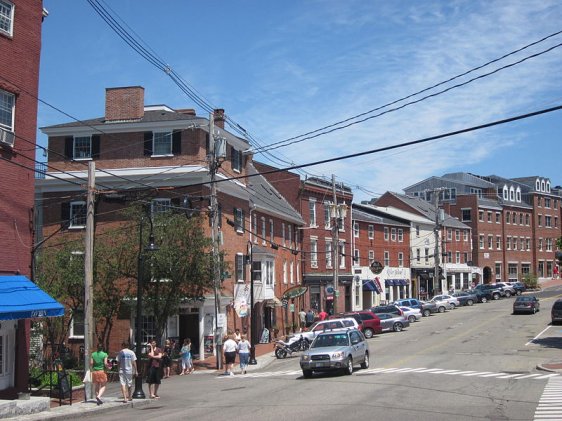Portsmouth is a historic seaport in Rockingham County, New Hampshire. It covers 16.8 sq mi (43.5 sq km) and has a population of 21,000 people (2011 estimate).
 Portsmouth, New Hampshire
Portsmouth, New HampshireSource: https://commons.wikimedia.org/wiki/File:Street_in_Portsmouth,_New_Hampshire.jpg
Author: Doug Kerr

The Portsmouth area was inhabited by the Abenaki tribe of Native Americans until the arrival of the first Europeans. Martin Pring explored and documented the site in 1603. This led to the founding of a village called Piscataqua in 1630. This makes it one of the oldest European settlements in the United States. The village was later renamed Strawberry Banke. Then in 1653, it was incorporated as a town and called Portsmouth, in honor of the hometown of the colony's founder, John Mason, who came from Portsmouth, England.
The fortunes of Portsmouth was directly impacted by regional events and history. When Thomas Jefferson placed an embargo on trading with Britain in 1807, it negatively affected Portsmouth, which depended on trade with Canada. The Industrial Revolution also brought economic growth to surrounding towns while activities at Portsmouth declined.
Today, Portsmouth has positioned itself as a local tourist destination based on its long history as well as its fine architecture from the Colonial, Georgian,
Visiting Portsmouth
Portsmouth is served by Interstate 95 (Maine/New Hampshire Turnpike) and Spaulding Turnpike.Places of Interest in Portsmouth
- Albacore Museum and Park
Museum on the USS Albacore, a US Navy submarine, and including the public park where it is dry docked. - Strawberry Banke Museum
Museum preserving the historic neighborhood of Strawberry Banke with some 42 historic buildings.
 Latest updates on Penang Travel Tips
Latest updates on Penang Travel Tips

Copyright © 2003-2025 Timothy Tye. All Rights Reserved.

 Go Back
Go Back